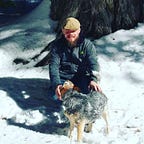Our Purpose As A Species
We sometimes assume that we humans are the benchmark of higher intelligence, when in fact we have our own type of intelligence because of our enlarged brains, and all other sentient beings have their own unique types as well.
We assume that our definition of intelligence is correct, which is our unique pathological delusion.
Sentience is the capacity to feel, experience, or perceive subjectively, whereas we conceive of the idea of intelligence as the objective perception of the world.
For over a decade I have experience the sentience of nature, both plants and animals. Now, my work revolves around understanding and working with the sentience of animals for the most part.
Instead of questioning what is sentient, I believe it makes more sense to define what is not sentient.
An animal is sentient by definition — they experience life through their senses.
Some people posit that plants are sentient as well, as they too experience life through chemical reactions, and the cells of their roots systems have neuron like electrical properties. Tomatoes have been show to create proteins in response to being wounded. There are numerous studies and books on the the types of consciousness that plants possess. Some people disagree with the idea that a plant possesses even the most rudimentary of consciousness, because that would call into question centuries of assumptions. But it remains true that plants act and react to the physical stimulus of the world using their own types of senses. Simply because they do not have a nervous system or brain like we do does not exclude them from the realm of the sentient. Plants and animal have evolved very different ways of being on this planet. https://www.psychologytoday.com/us/blog/the-green-mind/201412/are-plants-entering-the-realm-the-sentient
All sentient beings, in the end,are eaten by other sentient beings. All sentient beings depend on food and water to sustain themselves, and only the sun can make the green things grow and the water flow.
The giant exploding ball of gas that we call the center of our solar system is what powers the cycles of life and death here on our blue green planet.
Some scientists think our planet has it’s own type of consciousness, and thus is sentient in it’s own way.
Regardless of that notion, all life is sentient, thus when we talk about sentience, we talk about life, which is the biggest mystery of all.
The majority of the universe is devoid of life. Life is the most unusual spectacular thing to have evolved from space dust and gas.
So when we talk about the idea of sentience, which is the idea of life, we talk about an incredible anomaly, even in our own solar system, which holds no other life than what is on our planet.
Our planet hosts a number of species that are extremely perceptive and have big brains that can travel into the future or remember the past, like wolves, whales, and elephants. They, like us, have complex social and emotional lives.
We are able to use our senses to perceive and feel the world around us to such a large degree that we have been able to invent science, which helps us understand how the universe works. With our highly imaginative brains we have created complex cultures and religions and art and politics, all of which other sentient beings haven’t really touched, perhaps in part because there is no need for any of these things in their worlds.
Humans are extremely expert at creating artificial constructs in which to live, and one of those constructs is the idea that we are separate from all other animals. Hell, we even think we are separate from each other. Human beings are adept at creating artificial boundaries, and then we use violence in order to protect those boundaries.
The way our senses work and the way our brain and nervous systems and other bodily functions work are unique, yes, but that applies to all other species in the world. Our specific uniqueness comes from our enlarged brains, a brain which reinforces the idea of our dominance on the planet.
But our so-called objectivity in this regard is suspect — we are clever, yes, we can build skyscrapers and go to the moon. But are we really superior to all other life on the planet, or have we perfected the art of utilizing the superiority of all other life on the planet in order to make our own better?
In other words, humans excel at adaption and survival. We are extremely flexible when it comes to “making it work”, whether that means moving to another continent to hunt woolly mammoths or living in caves in the desert.
We will figure it out and make do. We will utilize the perfected evolution of other species to our own advantage.
In that, we are one of the most resilient creatures of all time. And yet, our physical forms are weaker than and less impervious to physical hardship than many other animals. It really is our cleverness alone that keeps us alive.
Humankind took the idea of toolmaking and went bananas with it. Instead of utilizing our own bodies as other animals do, we have utilized tools from bone and stone, tree and mineral, using fire and water and oil to fuel our inventions.
Our tools enrapture us. But in the end, they may end up distancing us from all other sentient creatures a bit too much, opening up a gap between us and nature that doesn’t need to exist.
If we can find a way to utilize our creativity in order to increase our empathy and connection to all sentient life, in order to increase the quality of life on this planet, not only for humans but also all plants and animals, than we have fulfilled our purpose as a species.
